November 28, 2018
A Spark of Light, by Jodi Picoult
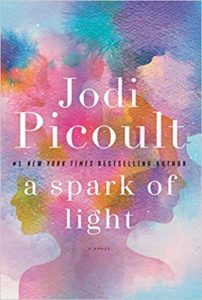 “Oh my gosh, does Jodi Picoult ever know how to write a novel,” I said to my husband the other night on the tail end of having read her latest in a single day. But of course she does, having written twenty-three of them, and has a reputation for bestsellerdom as well as a penchant for melodrama. I’d started one of her novels years ago—I think it was Nineteen Minutes, about a school shooting, and decided it wasn’t for me, and I actually hadn’t given Jodi Picoult a lot of consideration since…until A Spark of Light, set against a hostage taking at a Mississippi abortion clinic. And we all know there is nothing I’m more interested in than a good pop-culture abortion narrative, so I put this book on hold at the library, and it turns out that now I know what everybody else knows, which is Jodi Picoult is really extraordinary.
“Oh my gosh, does Jodi Picoult ever know how to write a novel,” I said to my husband the other night on the tail end of having read her latest in a single day. But of course she does, having written twenty-three of them, and has a reputation for bestsellerdom as well as a penchant for melodrama. I’d started one of her novels years ago—I think it was Nineteen Minutes, about a school shooting, and decided it wasn’t for me, and I actually hadn’t given Jodi Picoult a lot of consideration since…until A Spark of Light, set against a hostage taking at a Mississippi abortion clinic. And we all know there is nothing I’m more interested in than a good pop-culture abortion narrative, so I put this book on hold at the library, and it turns out that now I know what everybody else knows, which is Jodi Picoult is really extraordinary.
Obviously, her narrative being constructed around a hostage stand0ff, Picoult’s melodramatic bent continues, and I was wary of her reputation “for writing about both sides of polarizing issues.” Frankly, we’ve got far too much of “both sides-dom” going on in our discourse at the moment, which results in justifications for fascists being given wide-platforms, sympathy for white nationalists, and slow, terrifying and far from grass-roots growth of the anti-abortion movement in Canada. Now is hardly the time to stand on the middle, to sit on the fence, etc, instead at this dangerous political moment it’s more important to take a stand than ever, to draw a line.
The thing is, of course, that abortion isn’t actually polarizing after all, and the only people who might suppose it is are the people who’ve only ever considered abortion in the abstract or as a thought-exercise. But for those of us with lived experience of abortion and those who perform abortions as part of their medical practice, abortion is very much a space in between, where women who have abortions tend to be mothers already, where almost all abortions after 12 weeks are for very much wanted pregnancies whose severe and unviable fetal abnormalities, where women who miscarry and have abortions are sometimes the same women, where women who have abortions go on to have the families they wanted when they’re ready for it—and where “pro-life” women can find themselves on the other side of the debate when they’re faced with complicated or unwanted pregnancies. As Picoult writes in her novel’s Author’s Note: “Laws are black and white, The lives of women are a thousand shades of grey.”
And she shows so many of those shades in A Spark of Light, which begins with a paragraph on how Mississippi abortion clinics had had so many restrictions placed upon them (“the halls had to be wide enough to accommodate two passing gurneys; any clinic where that wasn’t the case had to shut down or spend thousands of dollars on reconstruction…”) so that those remained were rare as unicorns. On the periphery of the novel is a young girl who was unable to obtain an abortion due to age restrictions and other legal hoops to jump through so that she ended up administering a pill ordered from the internet, and when she’s brought to the hospital after bleeding profusely, police are called and she’s arrested for murder. The pregnant women in the clinic when the gunman breaks in are from all kinds of different backgrounds and in various situations, and some of them aren’t pregnant, because abortion is only one kind of health care administered by women’s health clinics. And what I loved most about the novel is that even the characters who aren’t pregnant or haven’t had abortions have had their lives touched issues of reproductive justice—sometimes without even knowing it, which is often the case in a society where things like rape, women’s sexuality and abortion are taboo.
The novel was gripping, and here is where I saw Jodi Picoult’s plotting prowess in action—the twists kept coming right to the end. And the novel is set in reverse chronological order, even, which makes the twists at the end all the most astounding from a craft standpoint, and none of them were cheap either—I really appreciated that. The characters were rich and fully developed, and this is where the novel was wonderfully challenging to me, in how Picoult humanizes a character who’s actually a pro-life protestor gone undercover to record illegal practices inside the clinic (she doesn’t find any, btw) when the gunman arrives. It turns out not to be about “both sides,” but instead understanding one’s humanity and motivations, in making characters real and multi-faceted, and learning where someone is coming from. Which doesn’t mean they’re right, and Jodi Picoult shows that they’re definitely not (fact: the best way to limit abortion is to have liberal abortion laws, access to birth control and sexual education. fact: making abortion illegal drives abortion underground and puts women at risk. fact: there has been abortion everywhere and always. fact: opposition to abortion is fundamentally an opposition to women’s sexuality). It remains ever important for us to listen to and learn from each other.
This is the kind of novel that can change the world, because if it challenged my ideas about abortion, it will also challenge the mindset of someone whose ideas are different, to consider other points of view. To bridge a divide that grows ever wider as we all sit convinced of our righteousness, without considering that someone on the other side feels just as righteous as we do. (Picoult doesn’t include male pro-life activists in the novel, who are the more typical demographic actually. I suspect that she knows that their motivations and backstories are less interesting than their women counterparts, that they have less to teach us in this situation.) It’s also just a thoroughly terrific read with great characters and plotting, and facts and current events while not being too heavy on the research, and really good writing, apart from one unfortunate paragraph where a father makes a twist on that “one’s child being your heart outside your body” idea to talk about a child being like a soap bubble you carry on your palm while you run through an obstacle course, or something like that. But let us forgive the novel that has just one terrible simile, especially if it does all the other incredible things. After twenty-three novels, Jodi Picoult knows what she’s doing.
November 27, 2018
My 2018 Best Books That Weren’t Published In 2018 List
I have but one complaint about literary 2018, which is that I didn’t read enough books that weren’t new releases, but then when I think about all the new releases I never even got to, I’m not sure what else I should have done. I did my best, but still, it’s those back catalogue books that keep one’s reading life truly interesting, I think. I will attempt more of this in 2019, and in the meantime, here are some very good books I read in 2018 that were published in previous years.
*****
 Joyce Wieland: A Life In Art, by Iris Nowell
Joyce Wieland: A Life In Art, by Iris Nowell
One of the biographies I read over the holidays, this was a fascinating look at the life of one of Canada’s most innovative and important artists.
*
 Salvage the Bones, by Jesmyn Ward
Salvage the Bones, by Jesmyn Ward
Behind on the times here. I finally read Men We Reaped last year, which meant I had to read everything else by Ward. Salvage the Bones is masterful and devastating, essential reading for our times (and I also loved Sing Unburied Sing).
*
 Life in Code, by Ellen Ullman
Life in Code, by Ellen Ullman
As I’ve found through reading and writing about blogging, women’s voices and experiences are so often missing from stories about the history of computers and technology. A coder since the 1970s, and also a fiction writer, Ullman has a singular voice and a unique perspective. I gave this book to my husband for Christmas but ended up enjoying the book as much as he did.
*
 Encyclopedia of an Ordinary Life, by Amy Krouse Rosenthal
Encyclopedia of an Ordinary Life, by Amy Krouse Rosenthal
I can’t remember why I ended up taking a whole bunch of books by Amy Krouse Rosenthal out of the library in January/February, but I did and they were delightful, and this one reminded me of the mundanity of the early internet in the most extraordinary way.
*
 The Ballad of Peckham Rye, by Muriel Spark
The Ballad of Peckham Rye, by Muriel Spark
I bought this book when we were on holiday in England during a snowstorm in March in a spiffy new edition, and it served to remind me that Muriel Spark is utterly strange and unfathomable, and brilliant.
*
 The Handyman, by Penelope Mortimer
The Handyman, by Penelope Mortimer
Of all the Penelopes, Mortimer is my favourite, although I read her best-known and reissued The Pumpkin Eaters and failed to love it, but her others have delighted me, reading as fresh, contemporary, subversive and unafraid of darkness.
*
 Behold the Dreamers, by Imbolo Mbue
Behold the Dreamers, by Imbolo Mbue
Everyone screeching about illegal immigration should read this book about the limits and challenges of people who are hoping to find their way to the American dream by any means necessary, the desperation of their plight. This was a novel that was rich with twists and surprises.
*
 A View Of the Harbour, by Elizabeth Taylor
A View Of the Harbour, by Elizabeth Taylor
I read this during the last weekend in June when it was so hot I almost died, and it had been been sitting on my shelf for years, and I’m so glad I finally got to it. It was so Woolfian, almost uncannily like an inversion of To the Lighthouse.
*
 What Alice Forgot, by Lianne Moriarty
What Alice Forgot, by Lianne Moriarty
Moriarty is a genius. I love her, and everything she does, and just because I exclusively read her books on vacation should not mean she does not get full points for character development and intricate plotting.
*
 Everything I Never Told You, by Celeste Ng
Everything I Never Told You, by Celeste Ng
I must confess that I liked Little Fires Everywhere better than Everything I Never Told You, mostly because a book that things people never tell each other sets itself up to be full of weird unbridgeable gaps and it brought up too many questions for me as a reader. But it was still really, really good.
*
 Moon Tiger, by Penelope Lively
Moon Tiger, by Penelope Lively
I reread Moon Tiger this summer after falling in love with it more than a decade ago. It was a contender for a best-of-the-Booker winner that went on earlier this year, and in this feature for the Guardian reading group, it’s discussed that the book was dismissed as “the housewives’ choice” when it won the Booker Prize in 1987. Lively is my other favourite Penelope, and it was a pleasure to be reminded of how huge and wonderful this novel is.
*
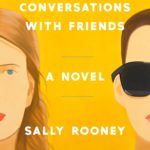 Conversations With Friends, by Sally Rooney
Conversations With Friends, by Sally Rooney
There was such hype for this novel that I must confess I was a bit disappointed when it didn’t blow my mind, but then blowing minds was never going to be what this book is about. Instead it’s subtle and quiet and most remarkable for the things the narrator is never able to articulate. I read it last week so I’m still thinking it over. Her new book is out here in the spring and even more hyped (nominated for the Man Booker Prize) so we will see what happens next…
November 27, 2018
Motherish, by Laura Rock Gaughan
 True confession: I find debut short story collections to be a bit hit and miss, more miss than hit, actually, but Laura Rock Gaughan’s Motherish turns out to be one hit after another. The entire book cohering around ideas of being a mother and having a mother, and smart enough to know that within this “niche” are a million degrees of experience. Every story is distinct, sparkling in its own particular way. It begins with “Good-Enough Mothers,” about a woman whose wife travels for work while she stays at home with their children and ponders the neighbourhood, including the family across the road who run a tow-truck company, and the woman next door who lives with her ailing adult daughter, and the strange and disturbing ways that these households’ connect with each other. Notions of bad mothers and good mothers intermingle here, and everything is relational. This story’s tone is ominous, dark-undercurrents. In motherhood always, there will be peril, and you’ll have to read to find out where.
True confession: I find debut short story collections to be a bit hit and miss, more miss than hit, actually, but Laura Rock Gaughan’s Motherish turns out to be one hit after another. The entire book cohering around ideas of being a mother and having a mother, and smart enough to know that within this “niche” are a million degrees of experience. Every story is distinct, sparkling in its own particular way. It begins with “Good-Enough Mothers,” about a woman whose wife travels for work while she stays at home with their children and ponders the neighbourhood, including the family across the road who run a tow-truck company, and the woman next door who lives with her ailing adult daughter, and the strange and disturbing ways that these households’ connect with each other. Notions of bad mothers and good mothers intermingle here, and everything is relational. This story’s tone is ominous, dark-undercurrents. In motherhood always, there will be peril, and you’ll have to read to find out where.
“Maquila Bird” takes place in Mexico where a woman who works in a garment factory sewing jackets aims to escape her employers’ mandatory pregnancy test and hold onto her job just a little bit longer. In “Transit,” a pregnant woman who is uncertain of the terrain that lies before partakes in an eventful streetcar journey. “Let Heaven Rejoice” is the story of an oblivious church organist and the thoughts of those around her while the music plays, including her husband and children. “At the Track” takes place during the summer of 1975 (“The summer of 1975, my grandfather’s friends wore leisure suits in turquoise and moss and mulberry with patterned shirts left open a few buttons to reveal an overgrowth of chest hair…”) when a young girl is left in the car of her not-always-responsible grandparents while her single mother works nightshifts. In “The Winnings,” a woman’s fiancé wins the lottery and she starts to reconsider their future together. “Me and Robin” is narrated by a young girl who cares for her effeminate younger brother, although her feelings toward him are ambivalent.
“Masters Swim” is a strange but compelling story about swimming, and sisterhood. In “The New Kitten,” a woman’s job as a bank teller gives her a unique perspective on her husband’s infidelities as she tracks his accounts. “Leaping Clear” is about a woman nearing the end of her life who is visited by the ghost of the man who’d got her “in trouble” years before, and reveals the real story of what happened to him after he skipped town (and what happened to her when she said yes to another man who wanted to marry her anyway). “Woman Cubed” about a contortionist and her overbearing partner. “Mother Makeover” about reality TV show when mother drama gets ramped up to max. And finally, “A Flock of Chickens,” which I loved, about a teacher who gets into an ill-advised relationship with a colleague and ends up in a chicken coop, as you do.
Which is all the stories in the book, actually, which means not a dud among them, and I enjoyed reading this collection so much, its tautness, its polish, and wise perspective on characters’ lives. Stories that are never samey, but instead such a pleasure to behold, one after anther.
November 26, 2018
Good and Mad, by Rebecca Traister
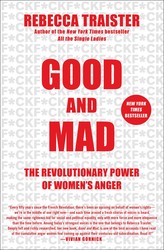 “The ability to narratively flip the dynamics of aggression and abuse—to view the less powerful as a menace to the aggressors—has been key to how white patriarchal structures have persisted. It’s how police can systematically killed black people but when black people protest those killings with Black Lives Matter marches, those protestors can be called “terrorists” on the news, or a “hate group,” by the Republican pundit Meghan McCain. It’s why, when Baltimore resident Freddie Grey was hauled into a van by police in Baltimore in 2015 and taken on a rough ride that resulted in his death, multiple news reports asserted that the “violence started” when protestors threw rocks in protest of his killing, and now when he was murdered.
“The ability to narratively flip the dynamics of aggression and abuse—to view the less powerful as a menace to the aggressors—has been key to how white patriarchal structures have persisted. It’s how police can systematically killed black people but when black people protest those killings with Black Lives Matter marches, those protestors can be called “terrorists” on the news, or a “hate group,” by the Republican pundit Meghan McCain. It’s why, when Baltimore resident Freddie Grey was hauled into a van by police in Baltimore in 2015 and taken on a rough ride that resulted in his death, multiple news reports asserted that the “violence started” when protestors threw rocks in protest of his killing, and now when he was murdered.
The violence done by the more powerful entity—the police and the state—to the less powerful entity is often so normalized, so banal, so expected as to not even be discernible, not even visible. But angry resistance to that violence, coming from the less powerful and directed at more powerful, is automatically understood as disruptive, dangerous, electric. The upset of power dynamics creates chaos…
These structural assumptions are why calls for civility almost always redound positively to the oppressors, because incivility against the oppressed is not only so normalized, it is also so comforting that it can barely be detected as oppression; while even the most trivial challenge from the less powerful sets off alarms.”
—Rebecca Traister, Good and Mad: The Revolutionary Power of Women’s Anger
November 22, 2018
Margaret Laurence and Jack McClelland: Letters
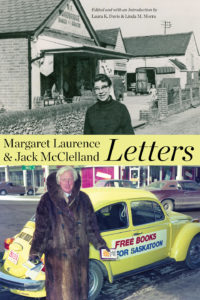 It’s not typically a ringing endorsement when I tell you in November about the book that I’ve been reading since June, but this is no ordinary book. Margaret Laurence & Jack McClelland: Letters, edited by Laura K. Davis and Linda M. Morra has been one of the highlights of my literary 2018, a mainstay on my bedside which I’d pick up and read a couple of pages from every night. It begins with a letter from Canadian Publisher J.G. McClelland who sends a letter to a “Mrs. Laurence” in 1959 upon learning from a mutual friend that she’d recently completed a novel whose description sounded like something he’d be interested in. “I would be delighted if you would let us have the opportunity to consider the manuscript,” he writes.
It’s not typically a ringing endorsement when I tell you in November about the book that I’ve been reading since June, but this is no ordinary book. Margaret Laurence & Jack McClelland: Letters, edited by Laura K. Davis and Linda M. Morra has been one of the highlights of my literary 2018, a mainstay on my bedside which I’d pick up and read a couple of pages from every night. It begins with a letter from Canadian Publisher J.G. McClelland who sends a letter to a “Mrs. Laurence” in 1959 upon learning from a mutual friend that she’d recently completed a novel whose description sounded like something he’d be interested in. “I would be delighted if you would let us have the opportunity to consider the manuscript,” he writes.
Three weeks later, Margaret Laurence sends her reply. along with her manuscript for This Side Jordan, and so a literary partnership was born, between one of Canada’s greatest writers and McClelland, of McClelland and Stewart, the iconic Canadian publisher. And what a thing to watch, to read—the camaraderie developing between them, Laurence finding her voice as a writer, McClelland’s nurturing of and respect for her talent, which continues through the book entire. By November 1960, they’ve dropped formalities and are “Jack” and “Margaret,” and they spar, and they gossip, and they worry for each other, and support each other, and their letters tell a great of the story of Canadian literature and publishing in the second half of the 20th century (which seems just as perilous and depressing as it is in the 21st, fuelled by passion and no cash. “The market for fiction is so bad,” McClelland writes Laurence in 1964).
She writes to him in 1965, “I have finally managed to get a novel finished, but do not know yet if it’s any good or not.” That novel was A Jest of God, which McClelland finally reads and responds to by telling her, “The thing that continues to amaze me about your writing, Margaret, is that you improve with everything you write.” I adored so many parts of this book in the specific, like when Laurence coerces McClelland into creating an LP to release alongside The Diviners, which was so not his jam and much more trouble than it was probably worth. Or when McClelland is speaking to a group of English teachers and railing against Alistair MacLean (“one of the worst writers in the world”—what a distinction!) and the teaching of his works in Canadian high school classes, and then one of the teachers responds with “here you have been complaining about the censorship of The Diviners and, at the same time, you are attempting to censor Alistair MacLean.” McClelland closes the anecdote with this: “It’s a crazy fucking world.”
I also really loved the story of Margaret Laurence’s trip to the Writers Development Trust fundraising dinner in 1982, mostly because I often find being an author in public is often an exercise in various humiliations (see my friend Rebecca Rosenblum’s recent post “Indignities”). There were various complications at this particular dinner, particularly involving Margaret Laurence having to wait for a long time in a stifling corridor with nowhere to sit down or get a drink, and then when she finally enters the event and arrives at her table, she discovers that her table is…empty. The businessman who bought her table is late, and then when he finally shows up, he spends 20 minutes talking to Pierre Berton, and he also neglected to invite anyone else to sit at their table. It’s agonizing, and hilarious, and so many of us have been there.
By 1986, however, the dust has settled enough that McClelland dares to invite Laurence to another fundraising dinner for the Writers Development Trust, but this time the party is in her honour, and he’ll even host it in Peterborough so she won’t have to travel, and she’s even in agreement. But in September of that year, he receives the news that Laurence has terminal cancer, and he writes to her immediately: “Funnily enough what catches me at this particular moment is that I wish to God I could write. I would like to write you such a superb letter that it would enchant your and enrich you and support you through whatever the months ahead have to impose on you. I just don’t have that gift [or] skill—the one in the world that I admire more than any other.”
Laurence would die the following January, and I must say I have some vague idea of how hard that must have hit McClelland, how much he must have missed her, because I could have read this book forever. And possibly I will.
November 21, 2018
Lady Franklin of Russell Square
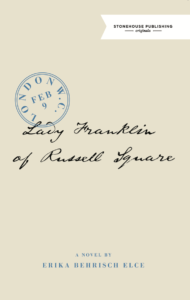 There is such a thing as a “[John] Franklinophile,” and I am not one, but still, Erika Behrisch Elce’s novel Lady Franklin of Russell Square delighted me. Written as a series of items discovered in old scrapbooks at Jane Franklin’s childhood home years later by a charwoman, the novel comprises news clippings of stories concerning the search for Franklin, who was presumed missing in late 1847, and also letters Lady Franklin had written for her husband from 1847 to 1857, the years during which went from imminently awaiting her husband’s homecoming to a gradual acceptance that he was not coming back. Not that she ever gives up home completely—she continues to use whatever money she can access to purchase ships and send out search parties, and she continues to engage the government in Britain to continue their search for Franklin’s party, and she solicits aid from abroad as well. No, she is not content to be “the Penelope of England,” as she was called in the press, and she doesn’t go for needlecraft. Instead, she consults maps with the same fervour her explorer husband must have (and the reader gets a sense that they were well matched in their thirsts for adventure), and reads the papers, and lobbies the government, and spends her time among the flowers of nearby Russell Square, with whose gardener she has developed an affinity.
There is such a thing as a “[John] Franklinophile,” and I am not one, but still, Erika Behrisch Elce’s novel Lady Franklin of Russell Square delighted me. Written as a series of items discovered in old scrapbooks at Jane Franklin’s childhood home years later by a charwoman, the novel comprises news clippings of stories concerning the search for Franklin, who was presumed missing in late 1847, and also letters Lady Franklin had written for her husband from 1847 to 1857, the years during which went from imminently awaiting her husband’s homecoming to a gradual acceptance that he was not coming back. Not that she ever gives up home completely—she continues to use whatever money she can access to purchase ships and send out search parties, and she continues to engage the government in Britain to continue their search for Franklin’s party, and she solicits aid from abroad as well. No, she is not content to be “the Penelope of England,” as she was called in the press, and she doesn’t go for needlecraft. Instead, she consults maps with the same fervour her explorer husband must have (and the reader gets a sense that they were well matched in their thirsts for adventure), and reads the papers, and lobbies the government, and spends her time among the flowers of nearby Russell Square, with whose gardener she has developed an affinity.
I loved this book. The letters are funny and smart, and sometimes angry and disappointed, and give the reader a rich perspective on this nineteenth-century woman’s interior life. An interior life that must necessarily be fictional, however, because Lady Franklin herself would destroy much of her personal correspondence, journals and records before her death. But if anyone is qualified to try to put the pieces back together again, it’s Erika Behrisch Elce, a Professor of English at the Royal Military College of Canada and editor of Lady Jane Franklin’s selected letters, As affecting the fate of my husband, in 2009. And I’m fascinated to consider how this novel must have grown out of that project, and how it felt for an academic to be blurring the lines between fact and fiction as she does here—and what kind of an adventure must that have been!
The prose sparkles in this novel, the plot is riveting even as we already know the ending, but maybe the ending is not the point—it’s the waiting instead. There is so much nuance in these letters, and also plot going on deep below the surface, and Elce also provides a remarkable record of the constraints placed on a Victorian woman, particularly one without a husband, the very opposite of the limitlessness imposed on so many men of the same era.
November 20, 2018
What I’ve Been Reading
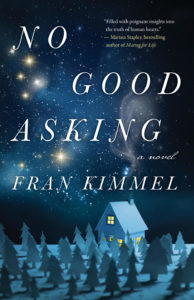 No Good Asking, by Fran Kimmel
No Good Asking, by Fran Kimmel
Kimmel’s novel is a perfect book for a winter’s night, the story of a cold world with warmth at its core. The Nyland family is close to breaking, estranged from each other even as they inhabit the same home. Eric has left his job with the RCMP and doesn’t quite know how to define himself outside of that role, plus he’s straining under the pressure of living with his elderly father after his mother’s death; Eric’s wife Ellie also wonders if coming to live with her father-in-law was the right choice, and she feels distant from her husband after years of disappointment and heartache after multiple miscarriages; plus, she is overwhelmed with caring for her youngest son, who has autism; and her teenage son is in trouble after crashing his grandfather’s car. And into this scene arrives Hannah, a girl escaping a traumatic home situation who needs a place to stay until proper foster care can be arranged. In connecting with Hannah, the family remembers also how to connect with each other, and while the novel is a little too lovely to be true (if only all children in care could have as little emotional baggage as Hannah does…), I forgave it because the other characters’ respective pain and sadness was so true and deeply realized—Kimmel does an incredible job of moving between all the characters’ different points of view. Plus, the scene that flashes back to Hannah’s mother and a trip they took together to the beach (which establishes Hannah’s solid grounding and makes clear that her late mother was such a good mother) is my favourite one in the book, rich with evocative writing.
*
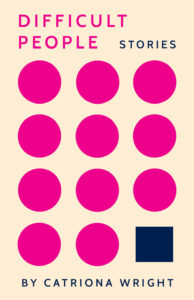 Difficult People, by Catriona Wright
Difficult People, by Catriona Wright
I am such a fan of Catriona Wright, whose first book was the remarkable poetry collection, Table Manners, and I’ve been looking forward to her fiction debut, Difficult People, whose first story hit me like a brick. “Content Moderator” is the story of a failed academic turned moderator on a social media site whose days are spent having her should destroyed as she is forced to view one horrifying image after another until her faith in humanity is as gone as her soul is, and it’s dark and awful with the cleverest twist. It will leave you disquieted, as will “Lean Into the Mic,” about a stand-up comedian whose personal struggles are seeping into her act in destructive ways, and the piece is formatted as a monologue. A woman’s relationship with a prison inmate takes a turn for the (even more) dysfunctional. “Olivia and Chris” takes place in a not-so distant future where white North American women are outsourcing their pregnancy to Asian surrogates, but take pre-natal yoga anyway for an authentic experience. In the title story, a woman continues to chase corporate success after the suicide of her brother, who had stowed away in their parents’ basement and become a passionate Wikipedia deletionist. A friendship between two women fizzles out when one accuses the other’s stepbrother of raping her. And finally, in “Them,” a woman navigates her distance from a childhood friend/roommate who has come out as transgender, which only exacerbates the usual coming-of-age struggles of friendship anyway. These are stories that are singular, and Wright has such an eye for detail, a knack for character and nailing a particular point of view, and for rendering the ordinary as strange and baffling as it actually is.(This book also makes a nice companion for Emily Anglin’s The Third Person, which I read in October.)
*
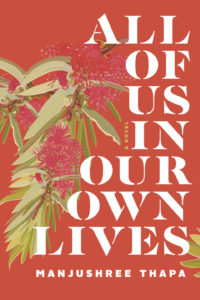 All of Us In Our Own Lives, by Manjushree Thapa
All of Us In Our Own Lives, by Manjushree Thapa
And I had the pleasure of reading Manjushree Thapa’s novel All of Us In Our Lives for Quill and Quire:
“First published in India in 2016 (and re-edited for publication in Canada), this is a novel that – as Gyanu is urged to do by a colleague – “look[s] at the world through a wide-angle lens.” Fitting for a story about cosmopolitanism, Thapa employs astral imagery and the connections between her characters create a kind of earthbound constellation. It is an ambitious project, drawing lines across continents, between cities and villages, and between people of different social standings and backgrounds. It works because characters’ experiences don’t map onto each other exactly, leaving room for complication and ambivalence.” (Go here to read the entire review.)
November 15, 2018
Andrea Warner and Buffy Sainte-Marie
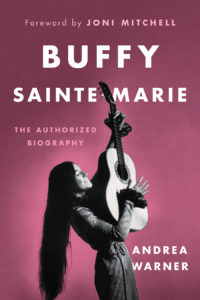 “One of the first things that Buffy said to me was, “I’m not much of a linear thinker.” And this was kind of a soft warning. Her mind jumps around, and she goes backwards and forwards in time a lot, but I love it. I love following the sudden jolts, and she almost always comes back to a point, too, even if she left it behind four thoughts ago. It’s a very creative thought process, a vibrant and lively one. ”
“One of the first things that Buffy said to me was, “I’m not much of a linear thinker.” And this was kind of a soft warning. Her mind jumps around, and she goes backwards and forwards in time a lot, but I love it. I love following the sudden jolts, and she almost always comes back to a point, too, even if she left it behind four thoughts ago. It’s a very creative thought process, a vibrant and lively one. ”
November 13, 2018
Call Them by Their True Names, by Rebecca Solnit

While I really liked Rebecca Solnit’s The Mother of All Questions when I read it during the spring of last year, there was something about its tone that didn’t ring quite right. “There is a Rebecca Solnit book for every moment,” I wrote in my review, and there is indeed, but I think The Mother of All Questions was supposed to arrive in a different kind of moment, the kind that so many of us were expecting when America was on the cusp of electing its first woman president back in November of 2016. There was an optimism to the collection that seemed incongruous with 2017 in general—celebrating 2014 as a watershed in which women finally began to be listened to and believed when they shared stories of violence, for example. When just two years later a man who bragged about sexual assault would be elected to his country’s highest office—some watershed, I thought. Like most things in 2017, it was depressing and I wondered if maybe Solnit didn’t have her finger on the cultural zeitgeist after all.
18 months later, however, my position has shifted. I was revisiting the essay on 2014 (“An Insurrectionary Year”) the other week, and realized that 2014 was only part of the beginning of the project of changing the way we look at women, and violence, and power, and that while the backlash is full-on four years later, it’s only because the project is really happening. A watershed, of course, is never about just moment, and it’s about ideas that are out there now and can’t be packed away again. Of course, society is still struggling to reconcile all this, but it’s happening. Nobody ever said it would be easy, and it’s not as hopeless as I thought.
Which is the point of Solnit’s latest collection, Call Them By Their True Names, which has a freshness and vibrancy that her previous book (along with everything else in 2017) may have been lacking. Solnit has been busy since then writing for outlets including The Guardian and LitHub, but I think I encountered most of the essays in this book for the very first time, and she continues the same message she began with her collection Hope in the Dark in 2004, about the grounds for hope lying in the fact that nobody ever knows what is going to happen next—and 2016 only underlines that. She writes about Trump and Clinton—and on white left-leaning men and Clinton, “They saw the loss as theirs rather than ours and they blamed her for it, as though election was a gift they withheld from her because she did not deserve it or did not attract them.” About the men whose misogyny has since been made implicit by #MeToo, who turned out to be the same men who’d been defining cultural conversations for decades and had been instrumental in the way Hillary Clinton was presented in her presidential bid—and Solnit connects the voices missing in these conversations to the votes that are missing from democracy after years of voters suppression by various means. I loved her essay “Preaching to the Choir” in which she interrogates that metaphor—”And is there no purpose in getting preached to, in gathering with your compatriots? Why else do we go to church but to sing, to pray a little, to ease our souls, to see our friends, and to hear the sermon?”
She writes about climate change, the prison industrial complex, gentrification in her native San Francisco, the fight to remove Confederate statues, the meaning of the protests at Standing Rock, and also, as always, about hope. The final essay in the book is “In Praise of Indirect Consequences,” which brings me back to 2014, and 2017, and how you never really know what’s going to happen, the hope implicit in uncertainty. “Hope is a belief that what we do might matters an understanding that the future is not yet written.” She writes that she did not anticipate and was “moved and thrilled and amazed by the strength, breadth, depth, and generosity of the resistance to the Trump administration and its agenda.” But she is concerned it might not endure:
“Newcomers often think that results are either immediate or they’re nonexistent…This is a dangerous mistake I’ve seen over and over. To see where we are, you need a complex calculus of change instead of the simple arithmetic of short-term cause-and-effect.”
And then: “The only power adequate to stop tyranny and destruction is civil society, which is the great majority of us when we remember our power and come together.”
November 7, 2018
More Fall Book Picks
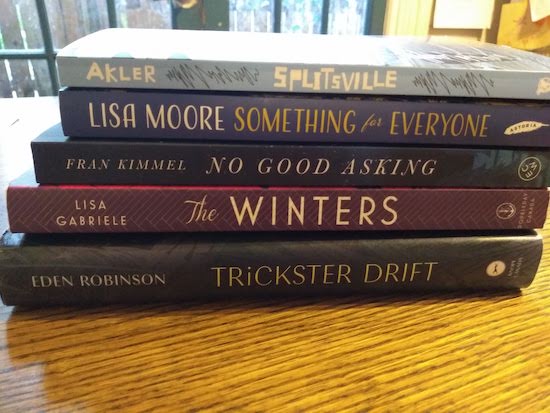
So many Fall Books to talk about this year that I had to do an extra instalment of my books column on CBC Ontario Morning. You can listen again to my recommendations on the podcast here (I come in at 46.00).





